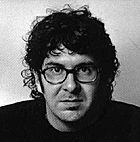|
|
||||||||
|
An Interview with the Author |
||||||||
| Excerpts: | ||||||||
|

Gay/Lesbian/Feminist Bookstores Around the Country
The Mostly Unfabulous Homepage of Ethan Green
![]()

 Interview with the Author
Interview with the Author
A Little Chat with C. Bard Cole, Author of Briefly Told Lives
Q: When did you first become interested
in writing?
A: I don't know, really. I see lots of things in my life that contributes to my writing today, and my childhood or teenage efforts at writing are only part of that. I've drawn for longer than I've written, I'd say. I used to make paper dolls by the boxful when I was a kid, or in other ways fascinated myself by creating characters – naming them, drawing them, deciding how they're related, plotting their stories. I guess in one way I started writing fiction because that was more acceptable for a boy to do than playing with dolls. But I still think of it in the same way, sort of. Fiction writing is an advanced and mediated form of playing with dolls.
Q: Briefly Told Lives is your first published book. How would you describe it?
A: To me, this is a collection of stories about how people make choices about their lives – whether those choices are deliberate, reckless, self-serving, made through a process of self-understanding or grasped at blindly. I'm interested in why people are happy, or not. Why they can be happy even if they don't permit themselves to see the truth of their lives, or why, in other cases, people choose to suffer even though they understand what they need to do to help themselves.
There are two sets of stories interwoven throughout this collection, one a series of third-person biographies, somewhat detached and glib, and the other more traditional, subjective first-person stories. This juxtaposition is central to what I'm doing. It highlights a tension I think is essential, a tension between writing as self-expression and self-exploration and storytelling as a creative, inventive process of imagination. I hope that by the end of the collection, these two impulses have been brought together again, but I wanted to call attention to the process – to examine the desire to invent people, places and stories.
Q: Your stories are often about people who haven't been written about too much in conventional literary fiction, gay fiction especially, but your writing style, as well, is somewhat unusual.
A: There were a couple of things I intended to do with language in these stories. To me, a story is always, in a certain way, about who's telling it and why… it's like Van Gogh or something: words are a writer's paint and I wanted to show the brush strokes. I think I have this virtual scrapbook in my head where I've stored all these examples of prose that have caught my attention through the years. I love slang and colloquial language, of course, and I've been influenced by rock music lyrics – terse and evocative without being, in a narrow sense, concretely descriptive.
Just this week I came across a Web site written by a Japanese girl in English and all of a sudden I remembered how remarkable I found Japanese English when I first came across it. One of my best high school friends had been an exchange student in Japan and had brought back all these magazines, pencil boxes, comics, in which English was used decoratively. I can still recite whole passages of this stuff, from fifteen years ago. It's beautiful – there's a real charm and poetry to its awkwardness. That's something I aspire to in my own writing. I never imagined, really, how angry it would make some people. Sex and violence I can understand being controversial, but prose?
Q: Do you have a specific audience in mind when you write?
A: Not really, but I think my book is, in many ways, a young person's book. In fact, a manuscript I wrote a few years back was solicited, after a reading I did, by a pretty important young adult books editor (which blew my mind, to be approached in that way), and although he was very appreciative of my work, he finally said, "Well, there's just no way I can get away with publishing a book like this – its content is just far too graphic; adults would have a fit over it."
My dream is to write the kind of books teenagers carry around in their backpacks and pass around secretly in school. I wanna be one of the writers bookstores put behind the counter because people steal them so often. Literary journals read by people 40-65 aren't where those reputations are made – in fact they're usually antagonistic to books like that; nowadays it's totally conventional wisdom in serious lit circles that J.D. Salinger's books, for instance, are appallingly self-indulgent and suitable only for immature minds who take them seriously… although the same people still want to read the gossip about him and how crazy he is. A Separate Peace, my earliest favorite novel, is now considered a silly, sentimental young adult book no one would take seriously as real literature. I don't get it. I think it's mostly that adults grow embarrassed thinking of their adolescent selves so they want to reject things that touch those chords. Well, and also because adults can be frightened of the emotional seriousness of teenagers and don't want to acknowledge it. But that's exactly what I find most interesting right now.
Copyright ©
2000 C. Bard Cole.
 Back
to the Stonewall Inn
Back
to the Stonewall Inn
